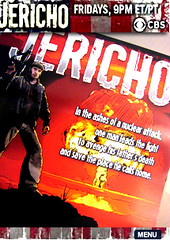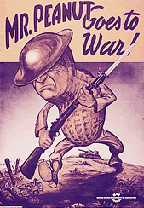“Thank you for your article from the set of Jericho. I was disappointed when I heard the show had been canceled. With well-developed characters and a compelling plot, it is not to be missed. Kudos to those involved in the peanut campaign for helping bring this addictive series back for season 2. Note to CBS: If you want to maintain viewership, stop killing story-line momentum by placing shows on hiatus for three months in the middle of their run.” — Natalie Payne (Mississauga, Ontario).
If Payne’s comment in the feedback section of Entertainment Weekly (Aug. 24) is any indication of the growing number of fans beyond the Internet, CBS might take notice. Not only do they exist, but their messages match those promoted by Jericho Rangers during the campaign.
It happens right here as well. We received about two dozen entries in our fan fiction contest after seeding it on dozens of contest sites. (Winners to be announced Aug. 31; and published every Sunday after.) But even more telling is that there isn’t a day that goes by when more Jericho fans seem to surface and find their way here, searching for the Jericho Season 2 schedule. And from here, they can easily find dozens of worthwhile Jericho links that line our posts. We are not alone.
The Hollywood Reporter has taken to calling it “the Jericho’ effect.” They say “TV bloggers came into their own as a force to be reckoned with this summer when their campaign to save CBS' canceled post apocalyptic drama* ‘Jericho’ became a triumphant success.” (*post-apocalyptic drama is not an appropriate description, but we know what might be.)
Just how much impact are TV bloggers and fans who have become disenchanted with the Nielsen rating system having? According to the article, they are influential enough that some television critics fear for their status if not their lives.
Seemingly overnight, networks now realize that fan engagement means better results than catering exclusively to the mixed reviews of entertainment writers. On this I can only offer that having been a reviewer for years, the industry needs to retool anyway. Sometimes, the remarks made are a bit sloppy, overly skewed toward personal preference, and often lifted right from the releases.
The Hollywood Reporter also notes that fans are attempting to lobby critics for favored comment (this is the price of semi-celebrity). And some fear fanatical fans and their ability to track them down (I hope that is not the case). Jericho is not the only show to see growing movements.
Teev Blogger reported last year that fans of Joss Whedon’s Firefly have been clamoring for more. Part of their wish is coming true. Multiverse Network has the rights to create a “massively Multiplayer Online Game (MMOG)” based on the TV show. Here is the latest news. Will it be enough? I don’t know.
Veronica Mars fans have a brand new site that says they want what Firefly got in lieu of a continued series — a full-length movie. Add to that a confirmation on the comic expected to be released by DC Comics in the late fall. Overall, the new movie campaign site seems be well thought out (though still under construction) with a nice summary of places to go for news.
Even Masi Oka (Hiro from Heroes) got into the act, reviving The Black Donnellys name when he made a quip about the show while giving critics a tour of an Irish pub: “This is where I go back in time and save The Black Donnellys.” While he meant to be playful, it does strike a chord. Although most people had never seen the show, everyone suddenly seems to know exactly what he is talking about.

If Payne’s comment in the feedback section of Entertainment Weekly (Aug. 24) is any indication of the growing number of fans beyond the Internet, CBS might take notice. Not only do they exist, but their messages match those promoted by Jericho Rangers during the campaign.
It happens right here as well. We received about two dozen entries in our fan fiction contest after seeding it on dozens of contest sites. (Winners to be announced Aug. 31; and published every Sunday after.) But even more telling is that there isn’t a day that goes by when more Jericho fans seem to surface and find their way here, searching for the Jericho Season 2 schedule. And from here, they can easily find dozens of worthwhile Jericho links that line our posts. We are not alone.
The Hollywood Reporter has taken to calling it “the Jericho’ effect.” They say “TV bloggers came into their own as a force to be reckoned with this summer when their campaign to save CBS' canceled post apocalyptic drama* ‘Jericho’ became a triumphant success.” (*post-apocalyptic drama is not an appropriate description, but we know what might be.)
Just how much impact are TV bloggers and fans who have become disenchanted with the Nielsen rating system having? According to the article, they are influential enough that some television critics fear for their status if not their lives.
Seemingly overnight, networks now realize that fan engagement means better results than catering exclusively to the mixed reviews of entertainment writers. On this I can only offer that having been a reviewer for years, the industry needs to retool anyway. Sometimes, the remarks made are a bit sloppy, overly skewed toward personal preference, and often lifted right from the releases.
The Hollywood Reporter also notes that fans are attempting to lobby critics for favored comment (this is the price of semi-celebrity). And some fear fanatical fans and their ability to track them down (I hope that is not the case). Jericho is not the only show to see growing movements.
Teev Blogger reported last year that fans of Joss Whedon’s Firefly have been clamoring for more. Part of their wish is coming true. Multiverse Network has the rights to create a “massively Multiplayer Online Game (MMOG)” based on the TV show. Here is the latest news. Will it be enough? I don’t know.
Veronica Mars fans have a brand new site that says they want what Firefly got in lieu of a continued series — a full-length movie. Add to that a confirmation on the comic expected to be released by DC Comics in the late fall. Overall, the new movie campaign site seems be well thought out (though still under construction) with a nice summary of places to go for news.
Even Masi Oka (Hiro from Heroes) got into the act, reviving The Black Donnellys name when he made a quip about the show while giving critics a tour of an Irish pub: “This is where I go back in time and save The Black Donnellys.” While he meant to be playful, it does strike a chord. Although most people had never seen the show, everyone suddenly seems to know exactly what he is talking about.




























